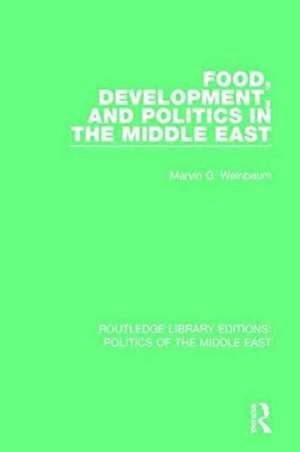Food, Development, and Politics in the Middle East: Routledge Library Editions: Politics of the Middle East
Autor Marvin G. Weinbaumen Limba Engleză Paperback – 12 dec 2016
| Toate formatele și edițiile | Preț | Express |
|---|---|---|
| Paperback (1) | 303.92 lei 6-8 săpt. | |
| Taylor & Francis – 12 dec 2016 | 303.92 lei 6-8 săpt. | |
| Hardback (1) | 698.17 lei 6-8 săpt. | |
| Taylor & Francis – 20 iul 2015 | 698.17 lei 6-8 săpt. |
Din seria Routledge Library Editions: Politics of the Middle East
- 12%
 Preț: 330.57 lei
Preț: 330.57 lei - 13%
 Preț: 323.44 lei
Preț: 323.44 lei - 12%
 Preț: 327.58 lei
Preț: 327.58 lei - 12%
 Preț: 327.58 lei
Preț: 327.58 lei - 14%
 Preț: 325.34 lei
Preț: 325.34 lei - 13%
 Preț: 297.62 lei
Preț: 297.62 lei - 13%
 Preț: 295.10 lei
Preț: 295.10 lei - 14%
 Preț: 300.01 lei
Preț: 300.01 lei - 13%
 Preț: 322.51 lei
Preț: 322.51 lei - 13%
 Preț: 297.15 lei
Preț: 297.15 lei -
 Preț: 320.36 lei
Preț: 320.36 lei - 12%
 Preț: 325.34 lei
Preț: 325.34 lei - 12%
 Preț: 325.34 lei
Preț: 325.34 lei -
 Preț: 457.14 lei
Preț: 457.14 lei -
 Preț: 310.67 lei
Preț: 310.67 lei - 12%
 Preț: 329.14 lei
Preț: 329.14 lei - 12%
 Preț: 325.84 lei
Preț: 325.84 lei - 14%
 Preț: 299.52 lei
Preț: 299.52 lei - 12%
 Preț: 329.26 lei
Preț: 329.26 lei - 12%
 Preț: 326.29 lei
Preț: 326.29 lei -
 Preț: 284.52 lei
Preț: 284.52 lei
Preț: 303.92 lei
Nou
Puncte Express: 456
Preț estimativ în valută:
58.15€ • 60.88$ • 48.12£
58.15€ • 60.88$ • 48.12£
Carte tipărită la comandă
Livrare economică 05-19 aprilie
Preluare comenzi: 021 569.72.76
Specificații
ISBN-13: 9781138923140
ISBN-10: 1138923141
Pagini: 218
Dimensiuni: 156 x 234 x 15 mm
Greutate: 0.32 kg
Ediția:1
Editura: Taylor & Francis
Colecția Routledge
Seria Routledge Library Editions: Politics of the Middle East
Locul publicării:Oxford, United Kingdom
ISBN-10: 1138923141
Pagini: 218
Dimensiuni: 156 x 234 x 15 mm
Greutate: 0.32 kg
Ediția:1
Editura: Taylor & Francis
Colecția Routledge
Seria Routledge Library Editions: Politics of the Middle East
Locul publicării:Oxford, United Kingdom
Public țintă
Postgraduate and UndergraduateCuprins
1. The Region: Its Food Potential and Constraints 1.1. The Food Deficit 1.2. The National Picture 1.3. Food and Assistance Systems 2. The Agricultural Sector in Development Policy 2.1. A Sectoral Profile 2.2. The Political Context 2.3. National Investment Strategies 3. Agrarian Development Goals and Strategies, and Class Inequalities 3.1. The Structure of Classes 3.2. Distributive Strategies 3.3. Reformative Strategies 3.4. Institutional Strategies: Cooperative Schemes 3.5. Institutional Strategies: Collectives 3.6. Basic Needs and Class Interests 4. Bureaucratic Values, Structures and Decisions 4.1. The Patrimonial System 4.2. Policy Implementation: Center and Periphery 4.3. Reform and Administrative Decentralization 4.4. Bureaucratic Decision Styles 5. Food Aid, Trade and Development Assistance 5.1. US Food Aid and Trade 5.2. US Food Aid and Foreign Policy 5.3. Assistance Programs and Trade: Europe and the Communist States 5.4. Multilateral Development and Financial Assistance 5.5. Intraregional Economic Assistance 5.6. Assistance and Domestic Policies 5.7. The Food-Oil Link 6. Food and Political Stability 6.1. Food and Urban Violence 6.2. Rural Discontent 6.3. Conflict and Production 6.4. Islamic Resurgence and Agrarian Policy 6.5. Prospects for the 1980s
Descriere
As the reality of a food deficit emerged in the Middle East, rural society and the agricultural sector – once viewed as peripheral to national development – swiftly rose up the policy agendas of nearly every Middle East country. This book, first published in 1982, looks at the complex interrelationships of food production, development schemes and politics in those countries. Dr Weinbaum considers the origins, nature, scope and political dimensions of the potential food shortfall and explores how food deficits could lead to changed international relations among states in the Middle East. He specifically examines the physical and technological limitations to increased food production, then assesses the major social, economic and political hurdles in the way of agricultural development, the effects of – and pressures for – agrarian reform, the bureaucratic policymaking process, and the domestic impact of foreign assistance policies. He concludes with an examination of the linkage between food supply availability and political stability.
